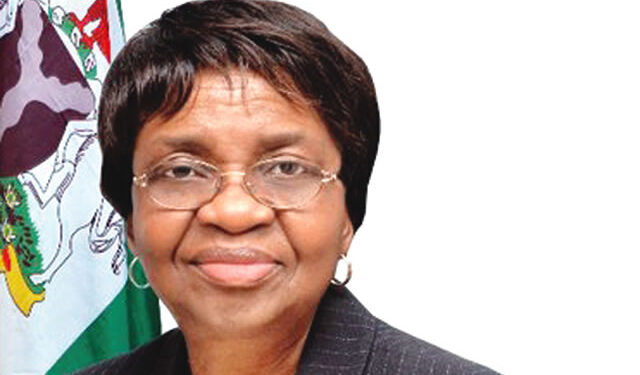The National Agency for Food and Drug Administration and Control (NAFDAC) has again issued a stern warning to Nigerians regarding the use of hazardous chemicals like Snipers and others to preserve food.
The warning is contained in a statement signed by Prof Mojisola Adeyeye, NAFDAC Director-General, and issued to newsmen in Abuja on Sunday.
Adeyeye gave the warning while responding to a viral video showing individuals using dangerous chemicals to preserve food items like beans, stockfish, and crayfish.
She said that the agency had many times emphasized on the dangers associated with dichlorvos (Sniper), a chemical commonly utilized by traders to safeguard food from spoilage, saying such could cause cancer, liver problem and others.
She said that the sale of small volume dichlorvos (100 ml or less), has been banned since 2019 while the sale of the large volume (one litre) was left to certify agrochemicals outlets.
Adeyeye said that NAFDAC underscored the toxicity of dichlorvos to human health, while cautioning that its use can have fatal consequences.
She therefore urged traders and merchants to desist from using unauthorized chemicals on food meant for human consumption, adding that the misuse of dichlorvos posed significant risks to human health.
According to her, the risk in using chemical for food preservation could manifest in both short-term and long-term exposure.
“Long-term exposure can result in severe health implications, including developmental abnormalities in offspring, memory loss, reduced fertility, and potential carcinogenic effects.
“These adverse effects highlight the importance of adhering to safety guidelines to mitigate the risks associated with dichlorvos exposure,” she said.
The D-G emphasized alternative methods for preserving food, while mentioning the use of bio-pesticides as a safer option compared to dichlorvos.
She noted that food remaining unspoiled for an extended period is an indication of pesticide contamination, rather than freshness, adding that unless such foods are stored in the refrigerator.
She said that NAFDAC had implemented several initiatives such as stakeholders’ sensitization meetings on restricting the direct application of dichlorvos on grains and foodstuffs in addition to the banning of the 100 ml size bottle.
Adeyeye said that the agency had initiated a thorough laboratory testing to ensure pesticide residues did not exceed maximum limits for both in-country consumption and for exports.
She said that NAFDAC had initiated routine monitoring of stakeholder to ensure compliance, while highlighting continued global best practices, including the phase-out of certain pesticides that have been banned in other countries due to proven toxicity.
She acknowledged the challenges faced by farmers due to bans on various chemicals and emphasized the importance of transitioning to safer alternatives.
The D-G also addressed the misconceptions about banned chemicals being dumped in Nigeria, and clarified that comprehensive lists have been provided to the media to dispel such notions.
The statement also quoted the Director of Veterinary Medicine and Applied Products (VMAP), Dr. Rametu Momodu, reiterating that using certain chemicals, especially pesticides, to protect grains and prevent beans from having weevils is not an approved practice.
Adeyeye explained that there were approved pesticides for use as fumigants, which should be used according to the manufacturer’s specifications on the product label.
She stressed that these products should not be applied directly to food due to their inherent dangers to human health, while elaborating that consuming food contaminated with dichlorvos could cause dizziness, vomiting, difficult breathing, tremors, and convulsions.
According to her, in some cases, such could lead to coma and death, and that once a pesticides is used on food items, it remains or residual on such food, posing a significant health risks.
She said that washing such food did not mitigate the risk, as the harmful substance would have already soaked into it.
She stated that the agency could not recommend washing as a solution, as it gave a false sense of security.
Momodu urged grain merchants, market vendors, and farmers to adhere strictly to manufacturer guidelines and refrain from directly applying dichlorvos to beans and other foodstuffs, adding that it should be used as field crop treatment or a fumigant, to ensure food safety.
She also advised consumers to avoid buying from vendors known to use such practices and to report them to the nearest NAFDAC office for appropriate sanctions. (NAN)











